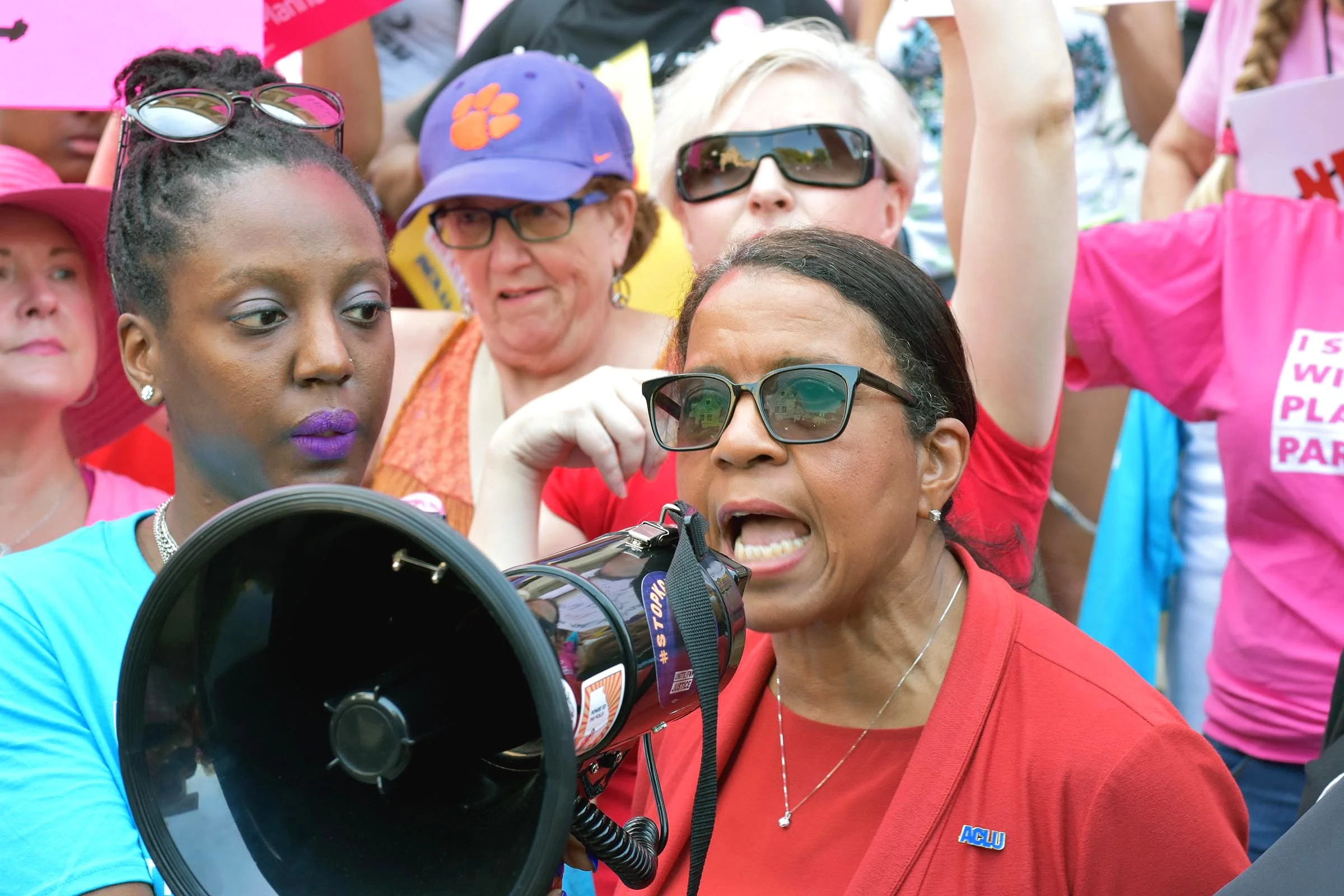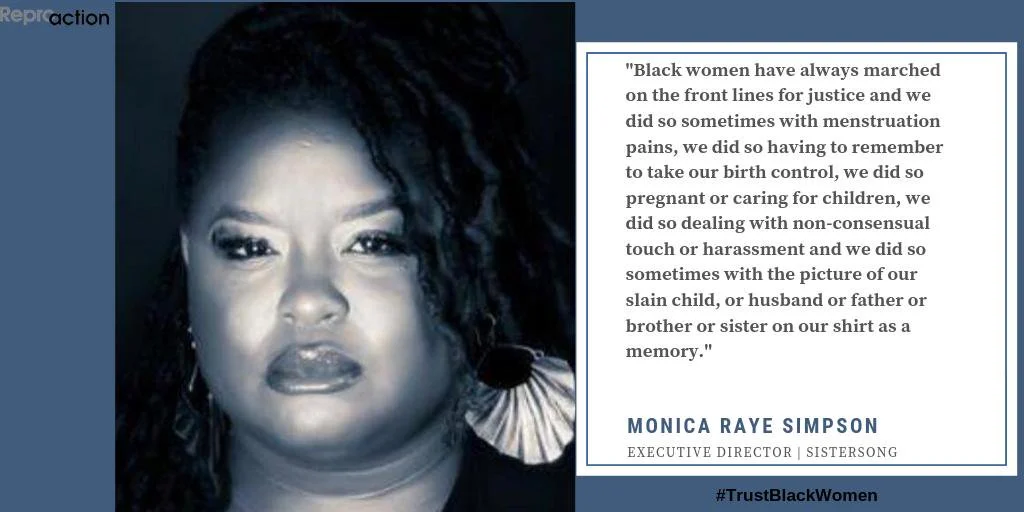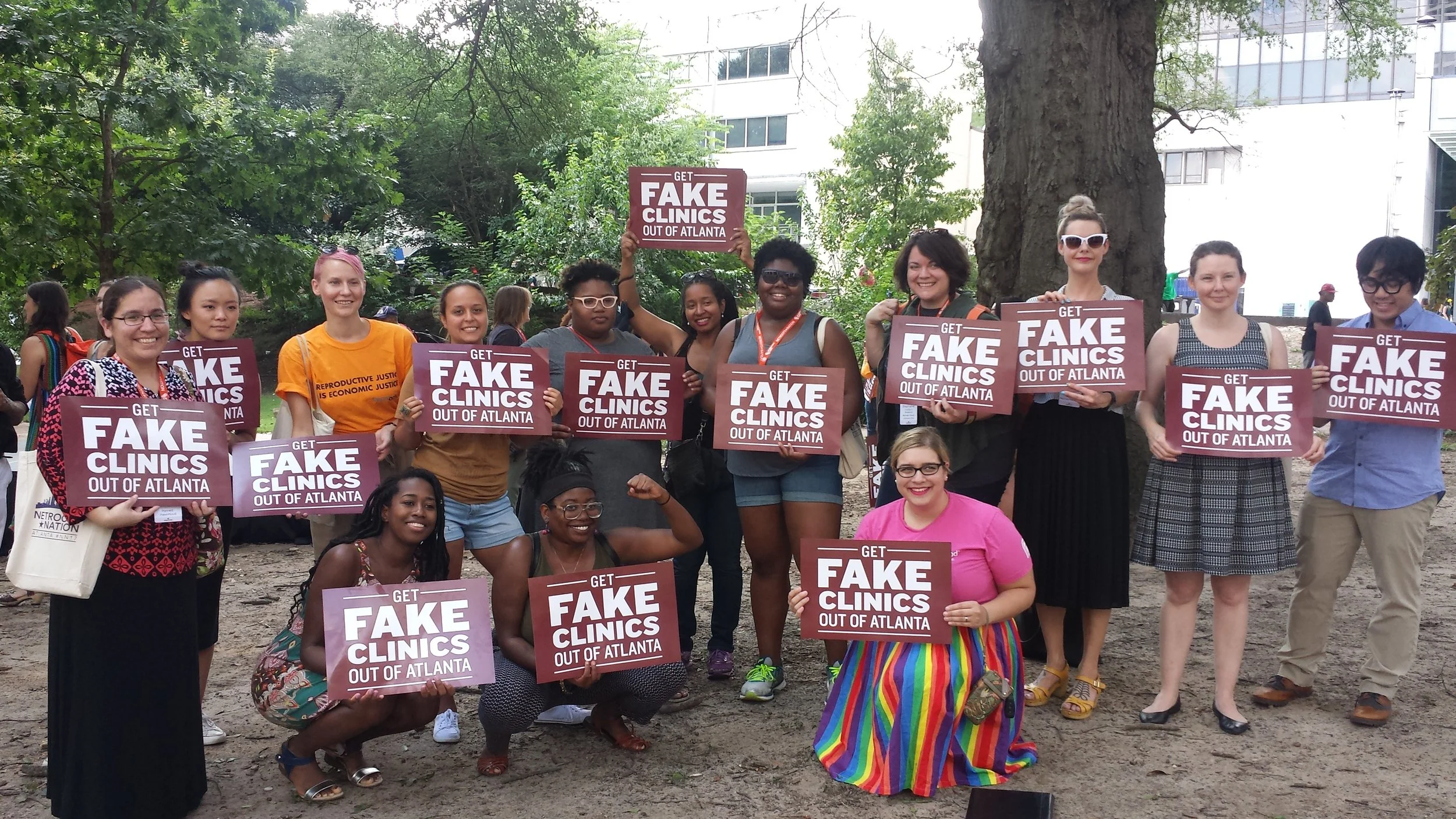New Abortion Ban Lawsuit Places Black Georgians Squarely at the Center of the Fight
/ACLU of Georgia Executive Director Andrea Young speaks into a megaphone at a rally outside of the state capitol building May 21, 2019.
By Imani Gandy. First published on Rewire.News.
A new lawsuit filed last week could eventually force the U.S. Supreme Court to examine how laws that attack abortion access disproportionately affect Black women and other women of color.
Centering the conversation on some of the state’s most vulnerable people was the American Civil Liberties Union (ACLU’s) motivation for naming SisterSong Women of Color Reproductive Justice Collective as the lead plaintiff in a lawsuit challenging HB 481, Georgia’s six-week abortion ban.
“I think the ACLU was very intentional,” Monica Simpson, executive director of SisterSong, told me in an interview. “The way that they wanted to approach this particular lawsuit was to make sure it was rooted in reproductive justice.”
Reproductive justice centers “three interconnected human rights values: the right not to have children using safe birth control, abortion, or abstinence; the right to have children under the conditions we choose; and the right to parent the children we have in safe and healthy environments.” Black women coined the term in 1994.
The reproductive justice movement was developed to challenge the anti-choice vs. pro-choice paradigm. As feminist activist and academic Andrea Smith explains in her critical essay “Beyond Pro-Choice versus Pro-Life: Women of Color and Reproductive Justice,” that binary is “a model that marginalizes women of color, poor women, and women with disabilities” and “reifies and masks the structures of white supremacy and capitalism that undergird the reproductive choices women make, and narrows the focus of our political goals to the question of the criminalization of abortion.”
The allegations in the complaint highlight how the legal right to abortion care does not always mean access to that care, especially for vulnerable communities.
In May, Republican Gov. Brian Kemp, who was elected under dubious circumstances, signed HB 481 into law. Dubbed the Living Infants Fairness and Equality (LIFE) Act—though it has nothing to do with fairness or equality and everything to do with reproductive oppression and cruelty—HB 481 bans abortion after a “heartbeat” is detected, which usually happens at around six weeks of pregnancy. Most people don’t know that they are pregnant at that time, which is generally two weeks after a missed period.
Notably, the language of the law—and indeed the prevailing language used by the media—is scientifically inaccurate. At six weeks, an embryo does not have a heartbeat. In fact, it has no cardiovascular system of any kind. Rather, the “heartbeat” in a six-week embryo is a group of cells with electrical activity. But “heartbeat” is far more provocative, and so that’s the language that anti-choice advocates and legislators settled on.
Georgia’s law also gives fertilized eggs, blastocysts, embryos, and fetuses that have not yet attained viability the status of “a class of living, distinct persons” that deserve “full legal recognition.” In other words, Georgia has granted personhood to so-called unborn children from the moment of fertilization without having to go through a messy constitutional amendment process like the one which played out in Alabama last year and led to voters in that state amending the state constitution.
The law is part of a nationwide assault on abortion rights. Anti-choicers’ salt-the-earth strategy goes beyond outlawing abortion; it could also criminalize miscarriage and potentially some forms of birth control. By passing laws that are unconstitutional under Roe v. Wade and Planned Parenthood v. Casey, anti-choice legislators are trying to provide a test case for the U.S. Supreme Court in the hopes that the conservative majority on the court will gut both. If that happens, pregnant people’s right to reproductive autonomy will be determined by a patchwork of state laws. (And, as my colleague Jessica Mason Pieklorecently wrote, Clarence Thomas has been champing at the bit to gut Roe, frequently complaining that he’s had enough when it comes to what he views as judicially concocted principles governing abortion rights.)
Laws like Georgia’s are not novel, and neither are lawsuits challenging them. In 2013, both Arkansas and North Dakota passed six-week bans that were permanently blocked by the Eighth Circuit Court of Appeals. Iowa’s six-week ban was blocked in state court in January, and a federal court judge recently blocked Kentucky’s six-week ban. I expect that Georgia’s law will similarly be struck down. So in that respect, this new lawsuit may seem unremarkable.
What sets SisterSong’s lawsuit apart from those that have come before it, however, is the explicit focus on Black women in Georgia. Indeed, the lawsuit squarely places Black pregnant people at the center of the abortion fight.
The allegations in the complaint are blistering and pointed: “Georgians face a critical shortage of reproductive health care providers, including obstetrician-gynecologists, and the rate at which Georgians, particularly Black Georgians, die from pregnancy-related causes is among the highest in the nation.”
“Georgians face one of the highest risks of pregnancy-related death in the nation, and pregnancy is three times as deadly for Black Georgians as it is for white Georgians,” it continues. “Rather than working to end preventable deaths, and rather than honoring Georgians’ reproductive health care decisions, the Legislature has instead chosen to criminalize abortion from the earliest stages of pregnancy.”
The lawsuit highlights how the attacks on abortion rights in Georgia will hit Black women the hardest, and emphasizes how difficult childbirth in Georgia is for Black women.
The conversation leading up to the filing of this lawsuit has been scattered. As reproductive justice advocates have tried to focus attention on the pregnant people the law will harm, celebrities have managed to center themselves in the social media conversation with ultimately unhelpful ideas like sex boycotts. In the wake of this chaos, reading SisterSong’s complaint was a breath of fresh air. As Jim Galloway noted for the Atlanta-Journal Constitution, SisterSong’s complaint is “part lawsuit, part feminist manifesto.”
I would add that the lawsuit reads like a Black feminist manifesto. And with Black women being at the center of so many recent political debates—whether it’s Sen. Kamala Harris (D-CA) taking Joe Biden to task about segregation or the media’s focus on Black women voters—it seems fitting that Black women and reproductive justice are at the heart of Georgia’s lawsuit. Indeed, it’s a long time coming.
“We saw this as an opportunity as a reproductive justice organization that’s been working for over 20 years to move reproductive justice as a frame and a movement to [the] center position because it’s so intersectional, because it’s human-rights centered, because it centers Black women, indigenous women, and Latinx women,” Simpson told me.
“The lawsuit centers all the right things that have been de-centered in these conversations. And it talks about the fullness of one’s life. It is not taking a single-issue approach, which I think continues to keep us in the reactionary mode: where we aren’t organizing, and mobilizing, and using a more intersectional frame.”
Simpson is absolutely right.
Thousands of protesters gathered at the Georgia State Capitol building in Atlanta to march
This lawsuit may be a vehicle for Black women to finally have a national conversation about reproductive autonomy as it pertains specifically to us. Many anti-choice advocates keen about the abortion rate in Black communities falsely accuse Planned Parenthood of using abortion as a eugenic tool to eliminate the Black population and lament that abortion is Black genocide. Despite these paternalistic claims, Black women have long understood reproductive coercion. This country was built from the wombs of Black women.
And I mean that literally. Domestic slave-breeding—which is just as dehumanizing as it sounds—was widespread during slavery, especially as the transatlantic slave trade was dwindling. An enslaved Black woman’s fertility frequently determined her worth. In order to protect themselves and their children, Black women frequently turned to herbal abortifacients and other DIY methods of abortion that included self-harm. It was not uncommon for Black women to kill themselves or their children in order to avoid repeated rape and forced childbirth or to avoid having their newborns ripped from their arms and sold into slavery.
Anti-choicers relish claiming that abortion is just like slavery and that laws legalizing it should be eliminated, just as laws legalizing slavery were. As I have written before, comparing abortion to slavery strips Black women of their agency and removes the enslaved Black woman’s experience from the historiography of slavery. But the comparison to slavery is unfit for an additional reason. Mandating birth for pregnant Black women is—to borrow a phrase from the 13th Amendment that abolished slavery—a badge and incident of slavery.
Perhaps this new lawsuit will lead to a national reckoning of the ways in which anti-choice legislators’ use of Black women as pawns in their abortion wars is not all that different from the ways in which white supremacy exerted a stranglehold on Black women’s reproductive freedom during slavery—and the ways it has continued to do so.
When it comes to reproductive rights, Black women have never been free, and this lawsuit is a good starting point for a conversation about that. I am certainly not expecting the conservative wing of the U.S. Supreme Court to make any groundbreaking revelations about reproductive justice and how this country has mistreated Black women for hundreds of years. But imagine the dissent that Justice Sonia Sotomayor will write should this case wind its way there. She routinely connects legal principles to their real-world consequences. Her dissenting opinion in Utah v. Strieff has been called a Black Lives Matter manifesto. Similarly, her dissent in Husted v. A. Philip Randolph Institute drew connections between Ohio using shady tactics to purge voters from their rolls and the consequences of those purges. I look forward to a dissent tackling the reproductive justice framework that might become a Black feminist manifesto.
The very thought of it is thrilling.























































